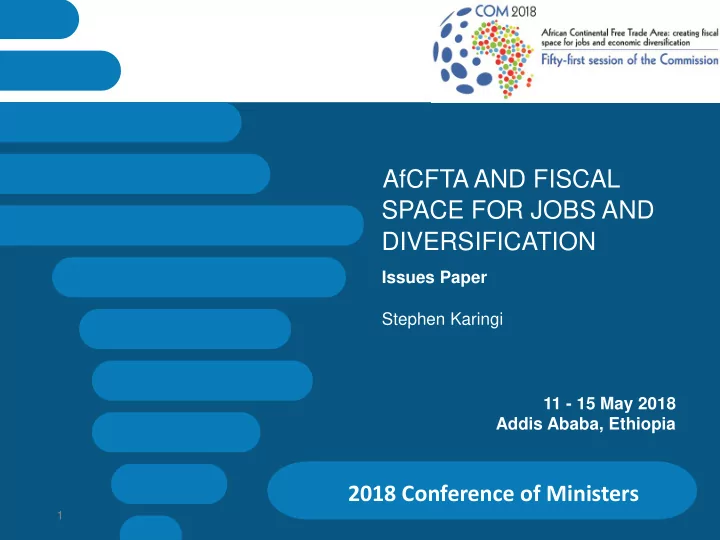

AfCFTA AND FISCAL SPACE FOR JOBS AND DIVERSIFICATION Issues Paper Stephen Karingi 11 - 15 May 2018 Addis Ababa, Ethiopia 2018 Conference of Ministers 1
Rationale| African business 2 Africa’s economic structure is broadly similar to India’s India Africa Population 1.3bn 1.2bn GDP 1.3bn 1.2bn Tax revenue to GDP 20.4% 20% India is a single consolidated market (7 th biggest in the world) • ➢ Allows scale economies and competitive businesses • Africa is fragmented over 54 countries and 107 unique land border ➢ Businesses face average tariffs of 6.9% non-tariff barriers AfCFTA and fiscal space for jobs and diversification | Issues paper UNECA.ORG 2
Rationale| African business 3 Opportunities for African businesses • The AfCFTA consolidates African market • Easing economies of scale and scope, and regional value chains • It also allows African businesses to gain from Africa’s good market dynamics Africa’s Gross Domestic Product at current market prices (US$ trillion), forecasts $16 tn $14 tn GDP (high-case scenario) GDP (low-case scenario) $12 tn $10 tn $8 tn $6 tn $4 tn $2 tn $0 tn 2000 2010 2020 2030 2040 2050 2060 AfCFTA and fiscal space for jobs and diversification | Issues paper UNECA.ORG 3
Rationale| Sustainable growth & jobs 4 Most African exports are extractives • Petroleum oils & gas, minerals, ferrous and precious metals • Volatile prices, produce few jobs, and fluctuating revenues Africa's extractive exports Extractive export prices 700bn 140 600bn 120 500bn 100 400bn 80 300bn 60 200bn 40 100bn 20 0bn 0 Crude oil, $/bbl Non-extractive exports extractive exports Metals & minerals, 2000=100 Precious metals, 2010=100 AfCFTA and fiscal space for jobs and diversification | Issues paper UNECA.ORG 4
Rationale| Sustainable growth & jobs 5 In contrast, intra- Africa trade… • Only 40% is extractives (compared to 70% of exports to outside Africa) Exports to within Africa Exports to outside Africa • More balanced and sustainable exports for sustainable growth • More labour intensive for creating jobs for Africa’s bulging youth population • Structural transformation and long-term sustainable growth AfCFTA and fiscal space for jobs and diversification | Issues paper UNECA.ORG 5
Rationale| Opportunities for all 6 Gains for different country types • ECA estimate all African countries to experience welfare gains. • More industrialized countries are well placed for manufactured goods, • RVCs can help suppliers from other countries. • Opportunities for satisfying Africa’s growing food security requirements. • Diversify exports for resource rich countries • Land-locked gain from trade facilitation, transit and customs cooperation • Also safeguards in case of import surges or threats of injury. AfCFTA and fiscal space for jobs and diversification | Issues paper UNECA.ORG 6
Fiscal space & sustainability| Tariffs 7 AfCFTA impact of tariff revenue to be small • Imports from other African countries only 14% of total imports. ➢ (Existing retained for remaining 86% of imports). • 56% of intra-African imports already free through pre-existing REC FTAs • Exclusion lists to protect important revenue products. • Implementation gradual: 5 years (15 for LDCs). • More gradual 10- 13 years for “sensitive” products. • Tariff revenues only 15% of total tax revenue in Africa. ➢ Tariff reductions will only affect a small share of tax generation. AfCFTA and fiscal space for jobs and diversification | Issues paper UNECA.ORG 7
Fiscal space & sustainability| Tariffs 8 AfCFTA will also have revenue benefits • Economic growth by 1 - 6% of GDP, ➢ Increase broader tax base and boost revenue collection. • Actual economic boost could even higher: ➢ Services and investment, which isn’t included in modelling. • The sectors that gain most produce more sustainable growth, ➢ Manufacturing and processed agriculture ➢ Better contribute to fiscal sustainability AfCFTA and fiscal space for jobs and diversification | Issues paper UNECA.ORG 8
Fiscal space & sustainability| Fiscal 9 It remains important for Africa countries to enhance their fiscal positions • Taking full advantage of the AfCFTA for its opportunities ➢ Will require investing new resources in the BIAT Action Plan • African countries need to mobilise resources in order for SDGs. ➢ Needed for SDGs: $600bn to $1.2tr per year • It is important that tax revenues are more stable and reliable ➢ External resources increasingly less so ➢ Can better channel these resources towards its own objectives. AfCFTA and fiscal space for jobs and diversification | Issues paper UNECA.ORG 9
THANK YOU! Follow the conversation: #2018COM More: www.uneca.org/cfm2018 10
Recommend
More recommend